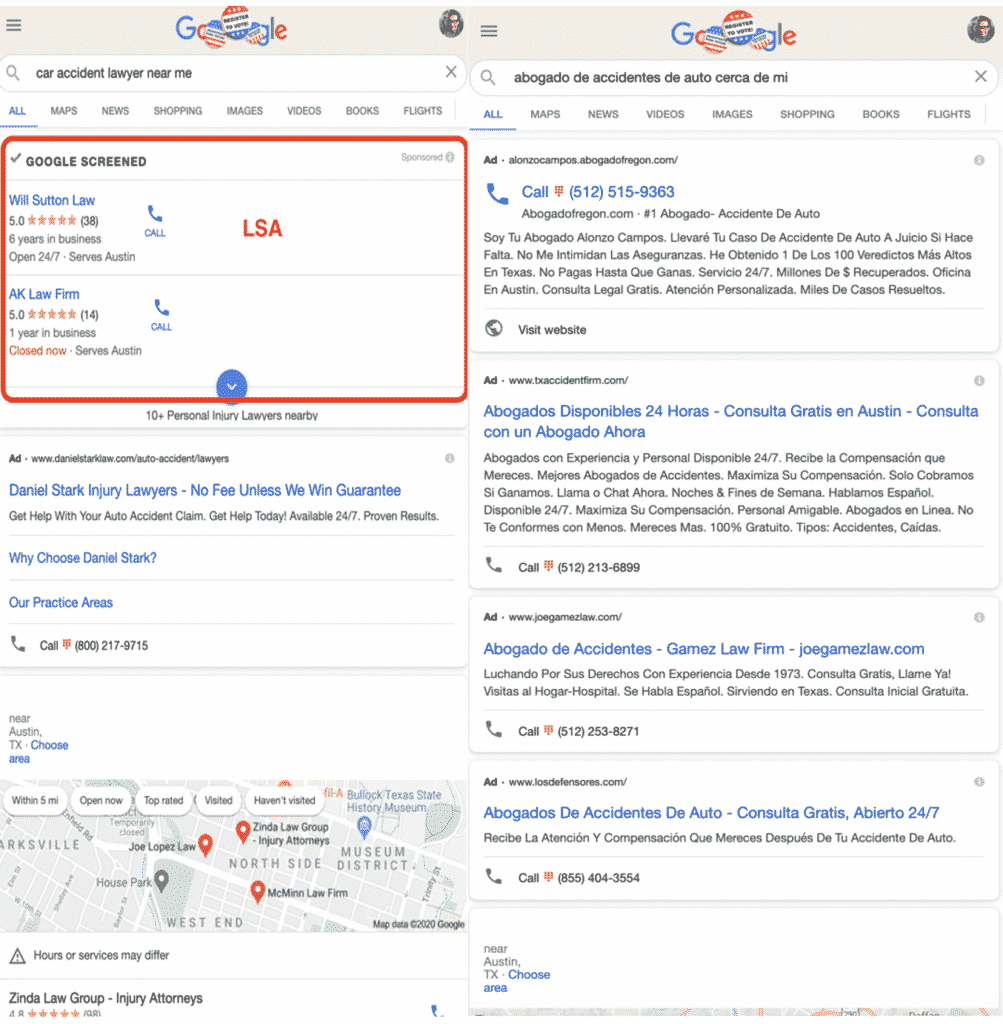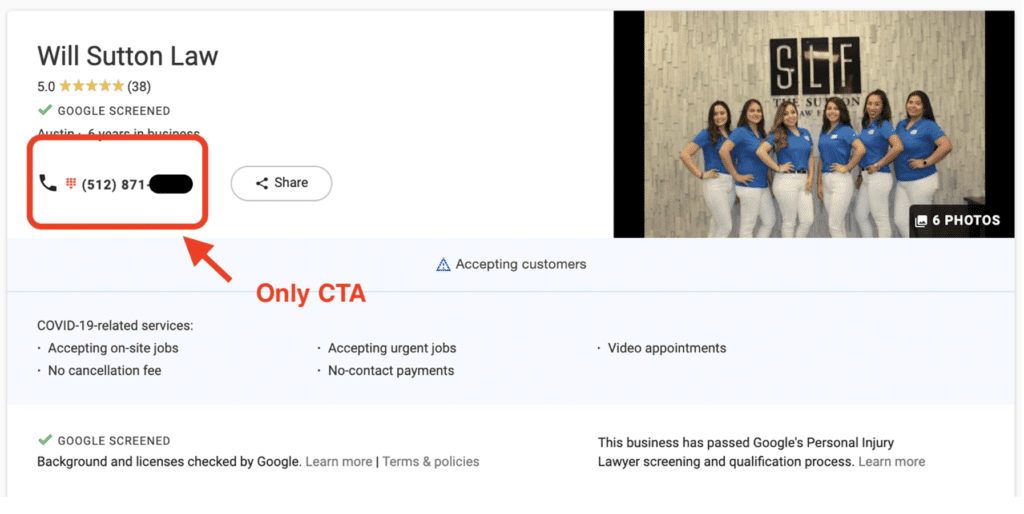If you’re like most business owners, learning that there’s a new option for marketing your law firm should definitely grab your interest.
If you heard the option comes from Google, you’d be nothing short of thrilled.
So, if you’ve already heard of Google’s Local Services Ads (LSAs), you may already be looking for room in your budget.
Maybe you’ve already invested in them.
Either way, keep reading. LSAs definitely have a lot of potential, but there is some significant “fine print” that you don’t want to learn about the hard way.
What Are LSAs?
Before we delve into some very important details about LSAs, let’s first go over some of the basics to ensure the rest of this information will be as helpful as possible.
In one very important way, Google Local Services Ads are similar to Google Ads: they’re both a paid marketing option that will put your firm above organic search results.
However, one of the big advantages of using LSAs is that, as their name suggests, they are only for local prospects.
On top of that, Google will show searchers your firm’s phone number, hours, and reviews.
Here’s where things really start to separate the two marketing options, though.
Provided your firm is a good fit for what the searcher states they want, they’ll be able to see relevant qualifications and Google reviews before deciding if they want to call you.
Now, if the user decides your firm isn’t a good fit for the legal services they need, they’ll be shown another LSA user and you’ll be saved the costs. In this way, LSAs can be a really fantastic way to keep your ad spend in check.
Why Are Some Law Firms Investing in LSAs?
First, until recently, LSAs weren’t even an option for most law firms. Originally, these ads were only available to two service areas: immigration and estate planning. Even then, firms that qualified could only participate in the BETA program.
That changed in July when LSAs were offered to law firms all across the country and across 17 different practice areas:
- Bankruptcy
- Business
- Contract
- Criminal
- Disability
- DUI
- Estate
- Family
- Immigration
- Intellectual Property
- Labor
- Litigation
- Malpractice
- Personal Injury
- Real Estate
- Tax
- Traffic
Since then, a number of firms have begun using them to build out their marketing campaigns.
As we’re about to explore, even though LSAs are now available to just about every type of firm, that doesn’t mean will cover all of your marketing needs. They have some very significant limitations.
So, why are so many firms investing in them anyway?
Well, to some degree, it’s probably the attraction of something new. If your firm is in an especially competitive area, any new option for advertising your services is going to be attractive. It represents the possibility of jumping on a powerful marketing asset before your competitors know about it.
But we won’t act like that’s the only reason firms have begun allocating money for these ads.
The big advantage of running them is that they show up in Google search results above everything else.
Yes, that even includes our beloved PPC ads. One of the many reasons to love those is that, traditionally, they’ve had that very top spot. Whereas getting to the top of organic search results can take years, you can jump the line by running successful paid ads.
With LSAs, you double-down on this advantage by beating out competitors running these reliable ads, too.
That’s not all.
For firms that qualify, there’s a “Google Screened” badge that will instill greater confidence in prospects looking for their services.
More credibility.
More clicks.
And, again, Google only charges for those clicks when they result in the prospect contacting you directly from the LSA ad. This is too big of an advantage for most firms to pass up. Imagine what your marketing campaign’s ROI would be if you were only being charged when qualified prospects actually got on the phone and spoke with you.
Furthermore, if you’re still new to running ads, what could be better than knowing you can afford to make some beginner’s mistakes without depleting your firm’s budget?
9 Important Limitations of Investing in LSAs for Your Law Firm
As we’ve mentioned, LSAs are a powerful way to improve your marketing budget’s ROI. They definitely have some unique advantages to offer, too.
So, it’s not that you shouldn’t consider finding room in your budget for them.
It’s just that there are nine potential limitations that you need to know about before you do. Otherwise, you’ll proceed with unrealistic expectations and suffer some frustrations that are always sure to follow.
1. LSAs Lack Visibility for Spanish Speakers
As a digital marketing agency that specializes in serving law firms, we definitely have a lot of pet peeves with LSAs that are unique to our industry.
Some of these are universal, but we’re going to assume that, if you’re reading this, you’re probably interested in how LSAs may or may not serve law firms.
That said, we’ve also long-been proponents of law firms marketing to Hispanic people. We’ve found that there’s a lengthy list of reasons they make for ideal prospects for all kinds of different firms, but you only get to enjoy those benefits if you know the specific ways they like firms to engage with them.
One of these ways is by using Spanish in your ads. This even holds if you are running ads you know will be seen by Hispanic prospects who speak English. Hispanic people will still take it as a good sign if they know your firm appreciates how big a role the Spanish language plays in their culture.
This why Spanish PPC ads have become one of our most popular services. You get right in front of qualified candidates and you – literally – speak their language.
This is also one of the reasons we’re frustrated with Google’s LSAs – at least for now. As you can see from the screenshots below, only search queries for practice areas in English will trigger these ads.

This is a pretty big disadvantage in our eyes.
Hispanics represent the fastest-growing demographic in the U.S., so even if you don’t market to them at the moment, you should definitely think about doing so soon.
Of course, you won’t be able to do that with LSAs. While English-speaking Hispanics may still click on your ads, you’ll lose one of the best ways to target this specific population if you choose options that don’t allow for Spanish.
2. Not Optimized for Desktop Leads
At this point, everyone knows that mobile is more popular than desktop devices. If you’re marketing online, you need to take this into consideration or you will absolutely leave money on the table.
A lot of money.
At the same time, the popularity of mobile devices is no reason to completely ignore desktop users, either. The disparity between the two isn’t great enough that your firm can afford to ignore the large percentage of leads who are still using desktops to search the Internet for the services they need.
This is something you need to think about for LSAs. It’s up to you to decide what kind of conversions you’ll accept for your firm. This could mean messages and email, but, for law firms, phone calls tend to be the most effective. In that case, your LSAs will still get shown to desktop users.

3. No Control Over the Services That Are Shown
This is a huge problem for any law firm, whether you plan on marketing to Hispanic people or not. In fact, this is a problem no matter what kind of services you offer, specifically because LSAs don’t really make it clear to prospects.
That’s right.
The most powerful search engine in the world invented a brand-new way to secure new business but won’t let companies specify what services they want to run their ads for.
That would be like having a sign above your restaurant that just says “Food” and taking your chances with who comes through the front door.
Maybe they’ll like the food you serve, but that’s far from certain.
Here’s another screenshot that gives you a good idea of what your prospects might see when they go searching for your help on Google.

For everyone else, this is not what you want to show potential leads. Unfortunately, there’s nothing you can do about it. Google doesn’t let you control bids based on specific keywords – like it does with Google Ads – so you have absolutely no control over how much you spend on specific practice areas and case types.
Now, that said, if you don’t want to go for the automated strategy “Maximize leads”, you can set a maximum bid per lead based on the maximum amount you want to pay for a lead.
Otherwise, imagine if it’s your personal injury firm running the LSAs that bring up the above screenshot in Google.
Are auto accidents worth as much to you as bicycle accidents?
Is there as much competition for dog bites as there is for slip-and-fall cases?
When you consider just how big a role strategic bidding plays in PPC, you can see why this feature of LSAs really rubs us the wrong way. Unless you take our advice about setting a maximum bid-per-lead, your efforts may struggle to produce a positive ROI.
4. New Firms Don’t Compare Well with Older Competitors
At Nanato Media, a lot of the law firms that come to us for help are either relatively new or they’re at least relatively new to effectively marketing themselves online.
Either way, one major challenge they face is that they generally can’t yet rely on the power of user reviews to help sell their legal services. They also can’t rely on Google to show off how many years of experience they have working in their field.[JG1]
This is a big challenge to their success.
It’s not just that reviews leverage the influence of social proof to show prospects what they have to look forward to as clients.
Those factors are big enough disadvantages to overcome, especially if you have numerous competitors that are currently enjoying what social proof and the appearance of experience delivers.
But there’s also the problem that these reviews aren’t something you can usually start earning overnight. The same is true for experience. It could be weeks or even months before you have a single client who will leave you one. It could be years until you start comparing favorably to your competitors.
Now, look, we can help with the reviews. We’re not trying to make anyone feel hopeless.
The reason we’re bringing it up is because LSAs highlight your reviews and experience – or lack thereof – and put them on display right next to those of your competitors.
So, if your firm is new or simply doesn’t have a lot of reviews, it isn’t going to impress potential clients if it’s positioned next to competitors that don’t have this problem.
Of course, this problem is even worse if you’ve recently received a bad review. Until you do something to overcome this reputational problem, you probably don’t want to pay to show it off to potential clients.
So, LSAs are still powerful, but you’ll need to work hard to build your social proof by courting reviews and actively manage your online reputation.
5. Almost No Control Over Cost-Per-Acquisition
Just like making the most of your budget is essential for improving your PPC returns, you need to understand how to control your cost-per-acquisition (CPA) for best results. Otherwise, you may end up learning a very expensive lesson when you finally discover that all of those leads you’ve spent so much money on aren’t actually delivering much of a profit (or maybe none at all).
Well, that’s another limitation of running LSAs.
Google will only allow you to set a weekly budget for your ads. After you confirm which types of cases your firm can handle…that’s about it.
Now, it’s up to Google.
If this sounds like a luxury – Google being kind enough to step in and automate your campaigns – you might want to rethink your strategy.
Provided you know what you’re doing (or you work with an expert who does – hint, hint), the more control you have over your ads, the better all of your results will be. Not just your lead-generation efforts but how much you’re actually spending on those new clients, too (i.e. CPA).
With LSAs, you simply won’t have as much control as you do when using other types of online advertising.
Google chooses what kinds of cases you show up for and they can all cost the same. You can very well end up paying the same price for a dog bite lead and a commercial vehicle lead and, even if you use the set-max-per-lead strategy, you run the risk of having your ads showing for practice areas that don’t bring in much money while not showing at all on big settlement cases.
For example, say you set the maximum bid-per-lead too low. Your ad will probably only show for dog bite cases but not for commercial vehicle cases. And yet, the lowest you can bid is $150.
Have you ever paid $150 for a dog bite lead? We really hope not because that would be a lot for this type of lead.
Google chooses how much you spend on those leads.
You could easily end up overpaying for a customer who wants a service you would never even run ads for in the first place.
So, our advice for running effective LSAs is to not add all the possible areas you practice. Instead, just focus on the best cases. Start bidding low, monitor the results, and then optimize from there.
We’ll talk about LSA bidding more in section 9.
6. “Pay-Per-Lead” Is Often Misunderstood by Users
This brings us to another lead-generation limitation inherent in the current way Google has set up their LSAs. We say “current” because there have been some changes to the program this past year and, as we’ll cover in section nine, more may be on their way.
In any case, for the time being, another frustrating issue we have with LSAs is that their advertised “pay-per-lead” system is a bit deceptive.
As we covered earlier, one of the perceived benefits of these ads is that Google only charges you when someone decides to send you a message or email you.
With your typical PPC ad, you’re getting charged as long as someone clicks on it. Whether or not they dial the number on your landing page, submit a web form, or simply decide to contact you later, you’re paying.
Consequently, many law firms end up spending a lot of money on “leads” who will absolutely never become paying clients.
(Again, this is a friendly reminder not to ignore your firm’s CPA)
Given this common issue with PPC, it may sound like a “pay-per-lead” approach is the perfect way to keep your costs under control while you also enjoy more qualified leads.
The big issue here is that “pay-per-lead” has the same problems just with another name. Anyone who sees your ad can decide to get in touch with you, after all. That’s the moment Google charges you. It’s not like they somehow wait until that caller becomes a paying client.
The good news is that, when they do charge you, you have the option to mark the client as booked. We assume that Google optimizes your campaigns according to the leads that are booked, but it’s important to note that there’s been no official statement confirming this.
It seems that you can use the reports section to add info about the client just as you would in your CRM. Basically, Google wants you to use their platform as a one-way solution.
7. It’s Far Too Easy to Get Banned from LSAs
Given all the complaining constructive critiquing we’ve done about Google’s LSAs, this might not seem like that big of a problem.
Who cares when you have so many other advertising options from which to choose?
We’ll address its potential uses in our conclusion, but sufficed to say, we’re not saying you should never use LSAs.
At all.
We recommend LSAs to law firms all the time.
That’s why it’s definitely a problem for us that Google seems far too trigger-happy when it comes to banning companies that invest in these ads.
Basically, all it takes is for a client to leave you a low rating or otherwise complain about your services. That has often been enough for Google to cut off forms from this marketing channel.
As long as this isn’t your first week as a lawyer, you know how easy it is to receive negative reviews even when you’ve done nothing wrong. You can earn them after your client didn’t listen to your advice and suffered the consequences.
That’s never a good thing, but consider what it will feel like if you are seeing results with LSAs and then lose them because some despondent client decides you’re to blame for something completely out of your control?
We’ve even heard of law firms getting banned because they missed leads’ phone calls or didn’t respond to phone submissions in time.
Obviously, you should train your intake team [JG2] so that this sort of negligence doesn’t occur, but it’s hardly a ban-able offense in our book. One or two leads complaining about when you called them back shouldn’t be enough reason to completely lose a major marketing channel.
8. Zero Analytics
If you’ve never read one of our posts before, here’s something you should know about us:
We.
Love.
Analytics.
They provide the data required to fuel constant improvements for your law firm’s marketing campaigns.
But when you first start out, they’re also the only way to know if you’re on the right path or not.
That’s why LSA Ad campaigns are so tough for beginners. Since Google does all of the campaign management for you, you really have no idea which search queries your most valuable prospects are using. The same goes for the search queries being used by prospects who never became paying clients. You can’t leverage negative keywords to keep them from messing up your CPA.
In many ways, Google is forcing business owners to take shots in the dark.
This is why you really need an expert’s help if you’re going to leverage LSAs.
One chapter you’ll never see in a marketing textbook?
“How to Take Shots in the Dark.”
By having an expert run your LSAs, you won’t have to rely so much on analytics. You can instead rely on their experience.
9. LSA Are Likely to Become Very Expensive
Earlier, we mentioned that there were still some more changes to come for Google’s LSAs.
If they follow similar trajectories as other marketing platforms under Google’s umbrella, there will probably be plenty of changes.
That said, there’s one on the horizon that would introduce a huge limitation if it comes to pass. We’re going to cover it because, at first glance, it doesn’t look like a big deal at all. In fact, to many business owners, it probably looks like a potential benefit.
Google LSA Bidding
Given what we’ve said about the importance of managing your budget and tracking your campaign’s analytics, it might come as a surprise that we’re taking a somewhat ominous tone on this topic.
After all, if you can bid, you can pick the keywords you want and better target separate segments, too.
Right?
Well…no. It doesn’t look like that’s how it’s going to work for LSAs.
Here’s how Search Engine Land describes how it appears bidding will be handled with LSA:
“Under the new auction-based pricing advertisers can only set one bid regardless of lead type. In other words, they must bid the same amount for a call, message or booking. If they operate in multiple verticals – as some in the home services industry do – they can bid separately by vertical (e.g., roofer vs. general contractor).”
That’s not great news for law firms who may be considering this marketing channel.
Furthermore, before you can even participate in the bidding option, you have to be certified as Google Screened. It requires licensing, background checks, and insurance.
And it’s not like the payout is that great given the hassle required just to be allowed to bid. You’re still forced to choose one bid for any conversion your firm receives, regardless of case type.
As marketers, there’s just no way for us to get excited about that prospect.
Bidding will actually mean paying more despite not necessarily improving your chances of seeing better results.
How to Create a Comprehensive Digital Marketing Strategy for Your Firm
We hope that you’ve found this whole article helpful, but there are two main takeaways we want to be sure to highlight before signing off.
The first is that LSAs carry a lot of promise, though it takes some experience to fulfill that potential. As we touched on, we’re not 100% against using them to grow your firm and attract new leads. Among other things, they’re a great way to gain another impression on SERPs. Your firm can show up in
- Search Ads
- Local Pack Ad
- Organic Results
- LSAs
Going after all four is going to yield much better results than just settling for one.
That brings us to our second takeaway: your firm needs a comprehensive digital marketing strategy, one that doesn’t rely on any one asset. At Nanato Media, we offer a wide range of marketing services for this very reason. With our years of experience, we know how to pick which ones will best serve your unique law firm.
Contact us today to learn more about how our firm would go about creating your customized marketing plan.



